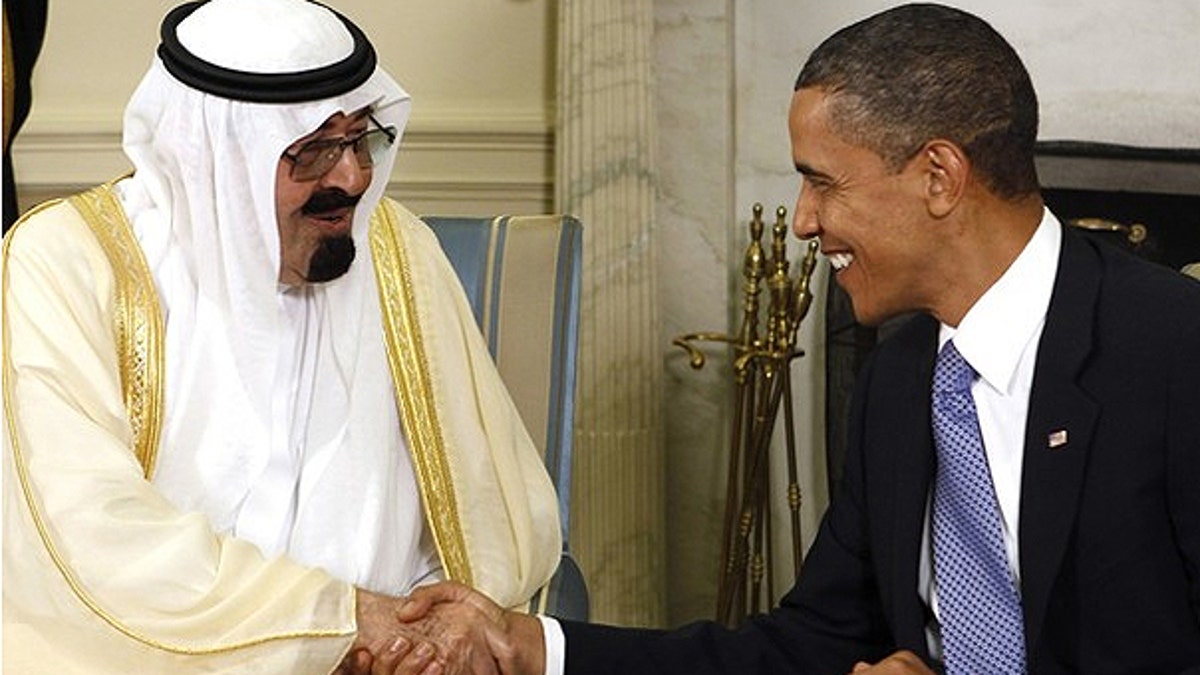
June 29, 2010: President Obama meets with King Abdullah of Saudi Arabia in the Oval Office. (Reuters)
Saudi Arabia has threatened to prop up embattled Egyptian President Hosni Mubarak if the Obama administration tries to force a swift change of regime in Egypt, The Times of London reported Thursday.
In a testy personal telephone call on Jan. 29, Saudi Arabia's King Abdullah reportedly told President Obama not to humiliate Mubarak and warned that he would step in to bankroll Egypt if the U.S. withdrew its aid program, worth $1.5 billion annually.
America's closest ally in the Gulf made clear that the Egyptian president must be allowed to stay on to oversee the transition towards peaceful democracy and then leave with dignity.
"Mubarak and King Abdullah are not just allies, they are close friends, and the King is not about to see his friend cast aside and humiliated," a senior source in the Saudi capital told The Times.
Two sources confirmed details of the King's call, made four days after the people of Egypt took to the streets.
The revelation of Saudi concerns sheds new light on America's apparent diplomatic paralysis and lays bare the biggest rift between the nations since the oil price shock of 1973.
The tough line from Riyadh is driven by concern that Western governments were too eager to shove aside Mubarak when the uprising began, without proper consideration of what should follow him.
"With Egypt in chaos, the kingdom is Washington's only major ally left in the Arab world and the Saudis want the Americans to remember that," said a source in Riyadh.
The White House declined to comment on the reports Wednesday, saying that the administration did not divulge what other leaders said to Obama.
However, it later said that Obama had discussed Egypt during a phone call with King Abdullah on Wednesday, saying the U.S. leader stressed the need for a meaningful and lasting political transition.
The news came as testimony gathered by the Guardian newspaper claimed that the Egyptian military, despite maintaining an appearance of neutrality in the ongoing crisis, had secretly detained hundreds and possibly thousands of suspected government opponents since mass protests began weeks ago.
Egyptians continued to demonstrate across the country Wednesday in a 16th day of protests against longtime leader Mubarak despite warnings of a crackdown by the regime if the continued uprising creates chaos.
Obama's most senior national security aides also met with Israel's Defense Minister Ehud Barak on Wednesday to discuss the situation in Egypt.
Meanwhile, the Egyptian military has been accused of being involved in both the disappearance and torture of Egyptian citizens, including the use of electric shocks.
Hossam Bahgat, director of the Egyptian Initiative for Personal Rights in Cairo, said hundreds, and possibly thousands, of ordinary people had "disappeared" into military custody across the country. Many were still missing.
"Their range is very wide, from people who were at the protests or detained for breaking curfew to those who talked back at an army officer or were handed over to the army for looking suspicious or for looking like foreigners even if they were not," he said.
"It's unusual and to the best of our knowledge it's also unprecedented for the army to be doing this."
The military has maintained that it is neutral in the current unrest.
NewsCore contributed to this report.












































